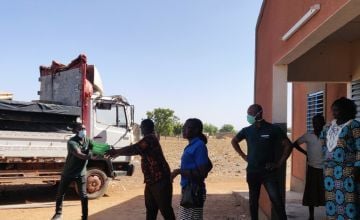
Read our 2023 annual report

Knowledge Hub
Student exam support, hospital supplies and food packages – a year of Concern Worldwide in Burkina Faso

Ireland’s largest humanitarian organisation, Concern Worldwide, has supported 87,000 people in its first year of operation in Burkina Faso, which is currently experiencing one of the fastest evolving humanitarian crises globally, alongside Ukraine.
1.9 million people have fled their homes amid extreme violent instability over the last two years in the west Africa country. 80% of those are women and children.
The security situation, particularly in the north and east of the country, continues to deteriorate with frequent attacks and killing of civilians. In January 2022 a military coup led to the country being suspended from the West Africa regional union.
“Food insecurity is increasing significantly, there’s been a 50% rise in the price of cereals in the last few months which is a very large increase for a country where most people are living on or below the poverty line,” said Katelyn Buisman, Concern’s country director in Burkina Faso.
“Staples such as wheat, oil, bread have all gone up by a lot. There’s increased pressure on fewer resources as so many people are displaced by the conflict so they haven’t been able to cultivate crops. Production last year was significantly lower than the five year average and due to the increased displacements I expect that it’ll be even lower this coming growing season.”
A poor rainy season has also contributed to low producing harvests. 80 to 90% of Burkinabés rely on agriculture for food and to earn a living.
It’s estimated that more than 3.5 million people in Burkina Faso currently require humanitarian assistance, a 60% increase in the last year.
However, the international funding response to the humanitarian situation remains vastly underfunded. Just 15.4% of the US$590 million required to meet humanitarian needs has been received.
Concern started its response in the centre-east of Burkina Faso as many internally displaced people travelled there from the East and Sahel regions due to its current relative security. Concern has supported 87,000 people through cash transfers for essentials such as food and water; hygiene and dignity kits that included items such as soap, buckets and sanitary items.
The major influx of people into new areas has put huge pressure on services in host communities. Concern has been supporting local health services by providing essential health service training, along with supplying hospitals and health centres in the region with beds, medical and non-medical equipment and medicines.
Concern has recently expanded operations to the north of the country, where the conflict is active, launching an emergency programme that is providing food items to 400 households (2,800 people).
As Irish Junior Certificate students were getting ready to sit their exams, so too were their Burkinabé peers. Concern supported 500 students aged 14 and 15 years old from rural, insecure areas of the North Region of Burkina Faso to sit their exams in the regional capital city, Ouahigouya through providing cash transfers to cover their room and board while there. Many of the students either had had seen their schools close due to insecurity, had moved away from their schools due to conflict or they no longer felt safe attending school. Also, due to the security situation, education officials were unable to travel to the north region to supervise the exams so the only option was for the students to travel to the regional capital.
“It’s a crisis that’s not getting a lot of attention globally,” said Ms Buisman. “A lot of the malnutrition cases that present themselves aren’t because parents don’t know the right foods to give their children or how to treat them for malnutrition; it’s because they just don’t have the food or money to feed their families.”
The next priority for Concern is to prevent it getting to the stage where people are facing extreme hunger by supporting them to earn money; through cash-for-work, small business training or kitchen gardens, so they can be independent and grow or buy food for their families.
ENDS
For more information or interview requests please contact Eilis Staunton on 085-872 0720 or by email: eilis.staunton@concern.net.
Other ways to help
Corporate support
Is your company interested in working together for a common cause?
Fundraise for Concern
From mountain trekking to marathon running, cake sales to table quizzes, there are lots of ways you can support our work.
Buy a gift
With an extensive range of alternative gifts, we have something to suit everybody.
Leave a gift in your will
Leave the world a better place with a life-changing legacy.
Volunteer with Concern
The lots of ways to get involved with our work as a volunteer
School fundraising
Without the generous support from schools, we wouldn't be able to do the work that we do.

